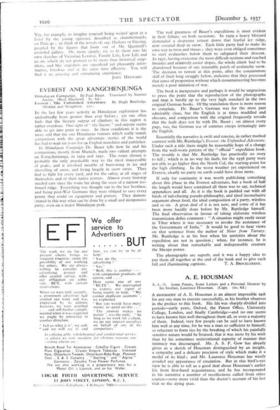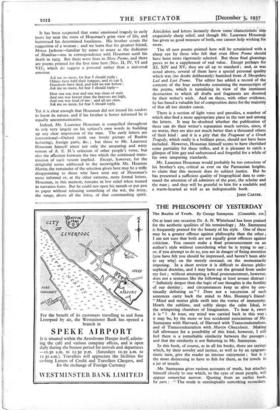A. E. HOUSMAN
A BIOGRAPHY of A. E. Housman is an almost impossible task for any one man to execute successfully, as his brother observes in the preface to this book. His life was sharply divided into periods—early years, Oxford, the Patent Office, University College, London, and finally Cambridge—and no one seems to have known him well throughout them all, or even a majority of them. Indeed, very few people can be said to have known him well at any time, for he was a man so sufficient to himself, so reluctant to form ties by the breaking of which his painfully sensitive nature would be bruised, that it was more by his wish than by his sometimes unintentional asperity of manner that intimacy was discouraged. Mr. A. S. F. Gow has already given us a sketch of Housman distinguished by an insight, a sympathy and a delicate precision of style which make it a model of its kind ; and Mr. Laurence Housman has wisely avoided any appearance of emulation. But in this bird's-eye view he is able to tell us a good deal about Housman's earlier life from first-hand acquaintance, and he has incorporated in his narrative a number of recollections culled from other sources—none more vivid than the doctor's account of his last visit to the dying man.
It has been suspected that some emotional tragedy in early years lay near the roots of Housman's grim view of life, and buttressed his determined loneliness. His brother scouts the suggestion of a woman : and we learn that his greatest friend, Moses Jackson—familiar by name to many as the dedicatee
of Manilius—was in correspondence with Housman until his death in 1923. But there were lines in More Poems, and there are poems printed for the first time here (Nos. II, IV, VI and VII), which do suggest a personal rather than a universal
emotion.
Ask me no more, for fear I should reply ; Others have held their tongues, and so can I, Hundreds have died, and told no tale before : Ask me no more, for fear I should reply— How one was true and one was clean of stain And one was braver than the heavens are high, And one was fond of me : and all are slain. Ask me no more, for fear I should reply.
Yet it is clear enough that Housman did not intend his readers to know its nature, and if his brother is better informed he is equally uncommunicative.
Indeed, Mr. Laurence Housman is compelled throughout to rely very largely on his subject's own words in building up any clear impression of the man. The early letters are conventional—Oxford (with one lovely picture of Ruskin lecturing), foreign parts, &c. ; but those to Mr. Laurence Housman himself attest not only the unsparing and witty venom of A. E. H.'s criticism of other people's verse, but also the affection between the two which the continued trans- mission of such venom implied. Except, however, for the delightful series addressed to the incorrigible Mr. Houston Martin, the remainder of the selection given here may be a trifle disappointing to those who have seen any of Housman's more informal or, at the other extreme, more formal letters.
Housman, in this memoir, remains in low relief when treated in narrative form. But he could not open his mouth or put pen to paper without releasing something of the wit, the irony, the range, above all the force, of that commanding spirit. Anecdotes and letters instantly throw some'characteristic into exquisitely sharp relief, and though Mr. Laurence Housman has given us good measure of both, one cannot help wishing for more.
The i8 new poems printed here will be scrutinised with a sharp eye by those who felt that even More Poems should have been more rigorously selected. But these final gleanings prove to be a supplement of real value. Except perhaps for XI, XIV and XV, they are all up to standard ; and, as was noted above, several of them have a special personal quality which was (no doubt deliberately) banished from A Shropshire Lad and Last Poems. The editor has added a record of the contents of the four notebooks containing the manuscripts of the poems, which is tantalising in view of the imminent destruction to which all drafts and fragments are doomed by their writer's wish. And on these, with other evidences he has based a valuable list of composition dates for the majority of that all too slender canon.
There is a section of light verse and parodies, a number of which also find a more appropriate place in the text and among the letters. It may be Adoubted whether the publication of these can do their writer's reputation much service, since, if no worse, they are also not much better than a thousand others of their kind : and it is a pity that the Fragment of a Greek Tragedy, which really is a brilliant piece, should not have been included. However, Housman himself seems to have cherished some partiality for these trifles, and it is pleasant to catch a glimpse of him gay and unbuttoned and forgetful for a while of his 'own unsparing standards.
Mr. Laurence Housman would probably be too conscious of his brother's eye, critical as ever on the Parnassian heights, to claim that this memoir does its subject justice. But he has presented a sufficient quality of biographical data to com- mand the attention of all admirers of the poet, the scholar and the man ; and they will be grateful to him for a readable and a warm-hearted as well as an indispensable book.
JOHN CARTER.



























































 Previous page
Previous page